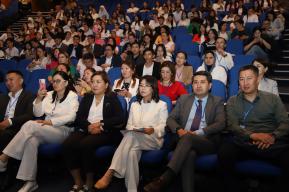Article
What you need to know about UNESCO’s 1974 Recommendation

Historic discussions are underway at UNESCO as delegates from more than 40 countries meet to review the updated text of the 1974 Recommendation concerning international understanding, co-operation and peace, and education relating to human rights and fundamental freedoms.
This signature international Recommendation provides a clear roadmap on how education should evolve in the 21st century to drive peace, reaffirm human rights and promote sustainable development in the face of contemporary threats and challenges. But what exactly does this entail, and what makes this text unique? Here's what you need to know.
What is the Recommendation about?
The Agenda for Sustainable Development, with its 17 Sustainable Development Goals, outlines a comprehensive blueprint to tackle pressing global issues. The 1974 Recommendation is the first international document that brings together and articulates education’s role in contributing to peace, international understanding, human rights, and fundamental freedoms.
It suggests a line of action without imposing legal obligations. Education in the spirit of the 1974 Recommendation aims to build peaceful and just societies, eradicate poverty, promote gender equality, enhance health and well-being, combat climate change, and promote understanding between nations and peoples. By intertwining these themes, the Recommendation provides a holistic approach to education and aligns efforts across sectors and fields of expertise to address common challenges and drive positive change.
While the Recommendation has been a progressive and driving force by establishing international principles and standards for governing education, and explaining how it should contribute to justice, freedom, and sustainable development, much has changed in the last 50 years that requires the document to be updated.
Why is UNESCO updating this Recommendation?
Responding to new and persistent challenges and threats to human rights and international understanding requires new approaches to education. The legal landscape has transformed, too: the international community now has a more robust set of agreements and frameworks to promote peace and non-violence, which were absent in 1974. New research and data have also enriched the development of effective policies and monitoring of their impact.
The revision of the 1974 Recommendation was inspired by the results of the Transformative Education Summit and the “Futures of Education” report that highlighted the need for a more relevant and forward-looking vision for teaching, learning and innovating.
What are the highlights of the Revised Recommendation?
- New understanding of peace
Peace is not just an absence of war and direct violence, but a positive and participatory process by which individuals and communities work together daily to build just, inclusive, healthy, sustainable and peaceful societies.
- Climate change and environmental sustainability
Destroyed schools, exacerbated poverty, increased dropouts, and displacement - the catastrophic effects of climate change are no longer isolated emergencies. They adversely impact people's right to education worldwide.
Education systems need to effectively improve their resilience to climate-driven crises and deal with their repercussions. Additionally, for learners of all ages to fulfil their potential and build peaceful futures, they need an understanding of the fragility of the planet and the increased interdependence of societies, natural resources, and ecosystems.
Fostering knowledge about the root causes of climate change, its impact, and ways to adapt and mitigate while not causing further damage to the planet are needed in order for individuals to make informed decisions and work towards creating a more sustainable society. The impacts of climate change on education and vice-versa cannot be ignored, and therefore, it is deeply woven into the revised Recommendation.
- Gender equality
Women still account for almost two-thirds of all adults unable to read, and girls often cannot fully enjoy their right to participate in, complete, and benefit from education. While much progress has been made in the past decades, significant gender gaps still exist due to poverty, geographical isolation, early marriage and pregnancy, gender-based violence, and traditional attitudes about the status and role of women and men, among other reasons.
Promoting gender equality and acknowledging its importance for realising the right to education for all is one of the Recommendation's guiding principles, reflecting UNESCO’s global priority.
- Global citizenship education
With pressing national and global issues transcending country borders, the role of education shifts beyond literacy and numeracy. It is increasingly about recognizing the world's interconnectedness and understanding the repercussions of our choices and actions on people and communities locally, nationally and globally.
That is why knowledge, skills, values and attitudes promoting tolerance, respect and a shared sense of humanity – components of global citizenship education – is finding their spot in the updated text. This may encompass teaching and learning about the impact of past and current events and conflicts, exploring economic, social and political linkages between countries and societies, and nurturing empathy and respect for the diversity of cultures and opinions.
- Media and information literacy skills
In an age where information is abundant, diverse, and easily accessible, media, information literacy, and digital skills are tools educators and learners need to survive and thrive. Critical thinking, empathy, and understanding of key principles of digital security, privacy and ethical online interactions are specifically highlighted in the updated text. Revisions suggested to the 1974 Recommendation acknowledge the challenges the digital landscape poses, such as misinformation and hate speech, and opportunities for teaching and learning that new technologies offer.
- Lifelong learning
By applying a lifelong learning approach, the Recommendation ensures that education remains relevant and accessible across different stages of life and at different levels. Connections are fostered between early childhood and adult education, formal education and technical and vocational training. Thus, anyone can acquire new skills, resume studies, or start them from scratch to pursue their dreams and contribute meaningfully to society.
- Non-formal and informal education
Schools do not function in isolation. The classroom is only one of many "spaces" where children socialize and learn. The Recommendation connects formal, informal and non-formal education and advances the importance of a whole-of-society approach for the benefit of learners. In this sense, the engagement of the entire school community in teaching and learning is one of the critical success factors. Parents, curators of extracurricular activities, sports and cultural clubs, community organizations, museums, media and civil society – all of these are essential partners in education. This may be particularly important for out-of-school learners.
How does the Recommendation help to transform education?
The Recommendation serves as inspiration for countries in developing and revising their national laws, policies and practices. For example, it can act a roadmap to give guidance for putting into place school policies that combat all forms of discrimination in education; or by launching mentorship programs or vocational training opportunities to ensure equal opportunities for all, and in particular for girls and women to access, excel in, and benefit from education.
How do we know the real impact of the Recommendation?
Member States submit reports on implementing the Recommendation to the UNESCO Executive Board – its governing body, every four years. This report is then analyzed, transmitted to the General Conference, and shared with other specialized agencies. It demonstrates their commitment to international solidarity and helps monitor their progress towards Sustainable Development Goal 4, target 4.7.
What is the next step?
After being agreed upon during the second session of the Category II meeting, the updated text of the Recommendation will be submitted to the General Conference in November 2023 in view of its adoption at its 42nd session. When adopted, the new text will replace the current one.
- 1974 Recommendation
- UNESCO’s work in global citizenship education









